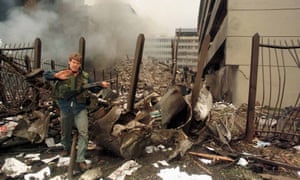Abu Muhammad al-Masri was gunned down in Tehran more than three months ago, says New York Times

A marine guard in the aftermath of the 7 August 1998 bombing of the US embassy in Nairobi, which Abu Muhammad al-Masri was accused of helping to mastermind. Photograph: Antony Njuguna/REUTERS
Al-Qaida’s second-in-command was killed in Iran in August by Israeli operatives acting at the behest of the United States, the New York Times has reported, citing intelligence officials.
Abdullah Ahmed Abdullah, who went by the nom de guerre Abu Muhammad al-Masri, was gunned down by two men on a motorcycle in Tehran, the NYT reported. He was accused of helping to mastermind the 1998 bombings of two US embassies in Africa.
Masri was seen as a likely successor to Ayman al-Zawahri, believed to be al-Qaida’s current leader.
It was unclear what, if any, role the United States had in the killing of the Egyptian-born militant on 7 August, the anniversary of the embassy attacks, the NYT said, adding that US authorities had been tracking Masri and other al-Qaida operatives in Iran for years.
Iran denied the report. Iran’s foreign ministry said in a statement that there were no al Qaeda “terrorists” on Iranian soil.
“From time to time, Washington and Tel Aviv try to tie Iran to such groups by lying and leaking false information to the media in order to avoid responsibility for the criminal activities of this group and other terrorist groups in the region,” the ministry said.
A US official, speaking to Reuters on condition of anonymity, declined to confirm any of the details in the NYT story or say whether there was any US involvement. The White House national security council did not immediately respond to a request for comment.
Masri was killed along with his daughter, the widow of Osama bin Laden’s son Hamza bin Laden, the Times reported.
The al-Qaida chief Osama bin Laden, who orchestrated the 9/11 attacks on the United States, was killed in a US raid in Pakistan in 2011.
Masri had been in Iran’s “custody” since 2003 but had been living freely in an upscale suburb of Tehran since 2015, the NYT cited unnamed US intelligence officials as saying.
US counterterrorism officials believed Iran, also a US enemy, may have let him live there to conduct operations against US targets, the NYT said.
It was not immediately known what, if any, impact Masri’s death has had on al-Qaida’s activities. Even as it has lost senior leaders in the nearly two decades since the attacks on New York and Washington, it has maintained active affiliates from the Middle East to Afghanistan and West Africa.
With Reuters
